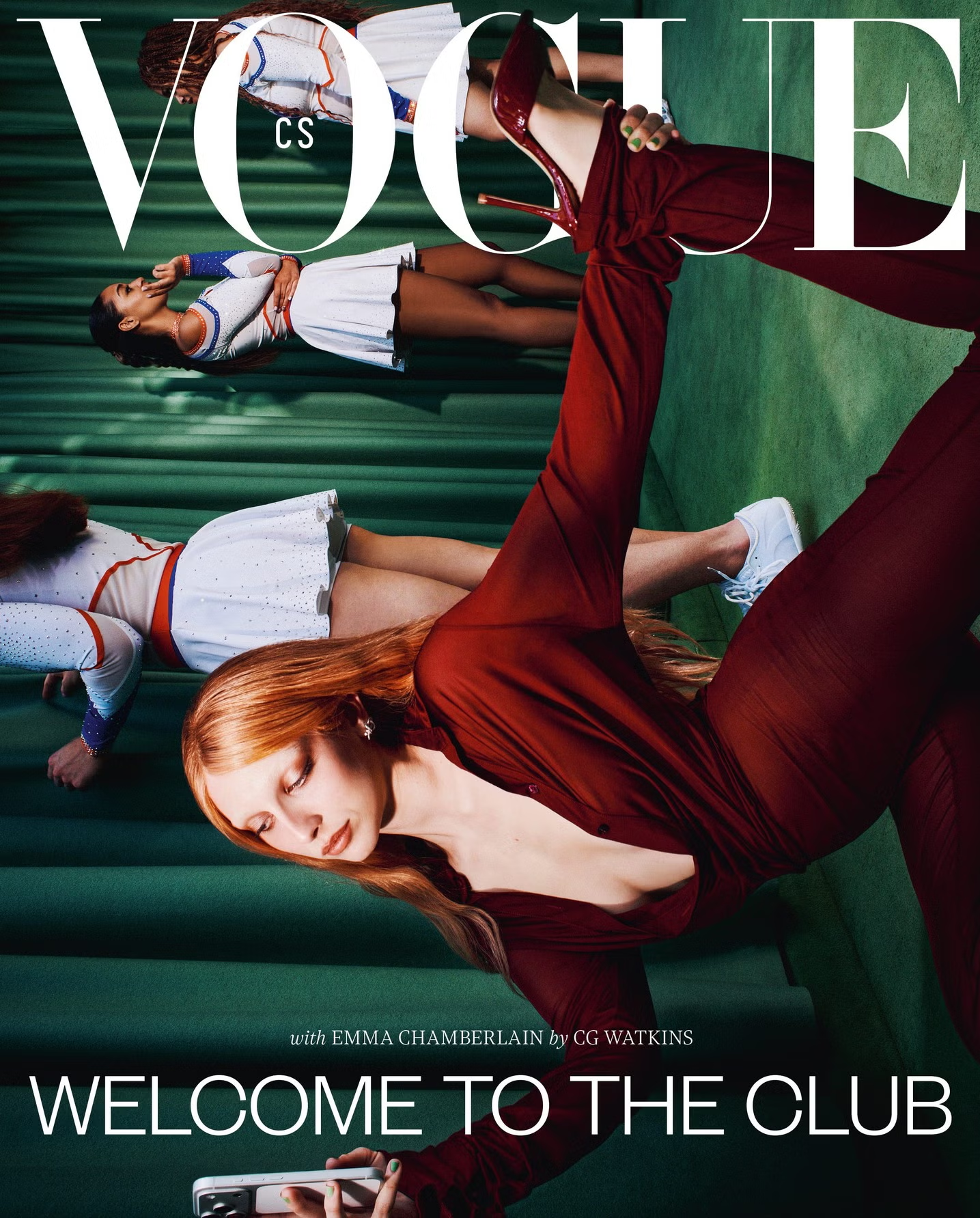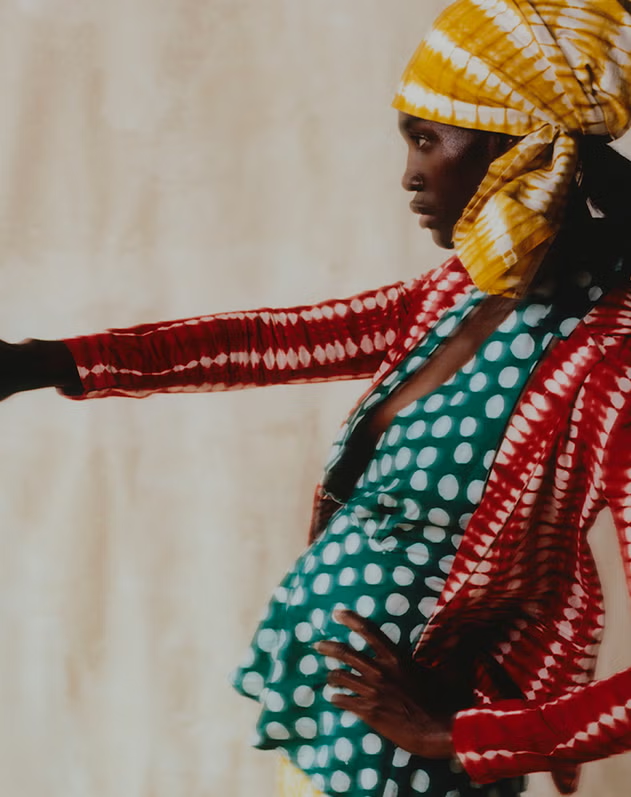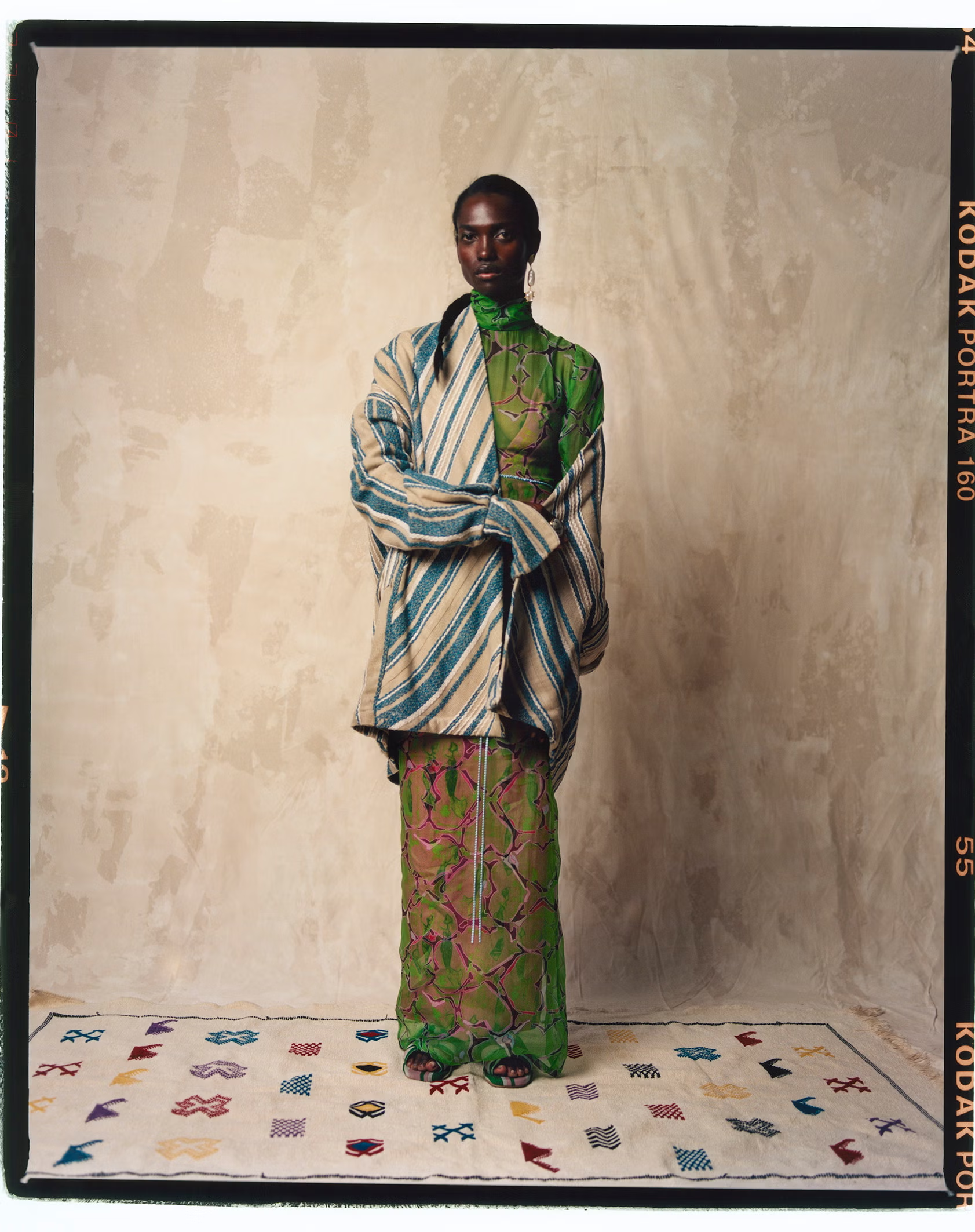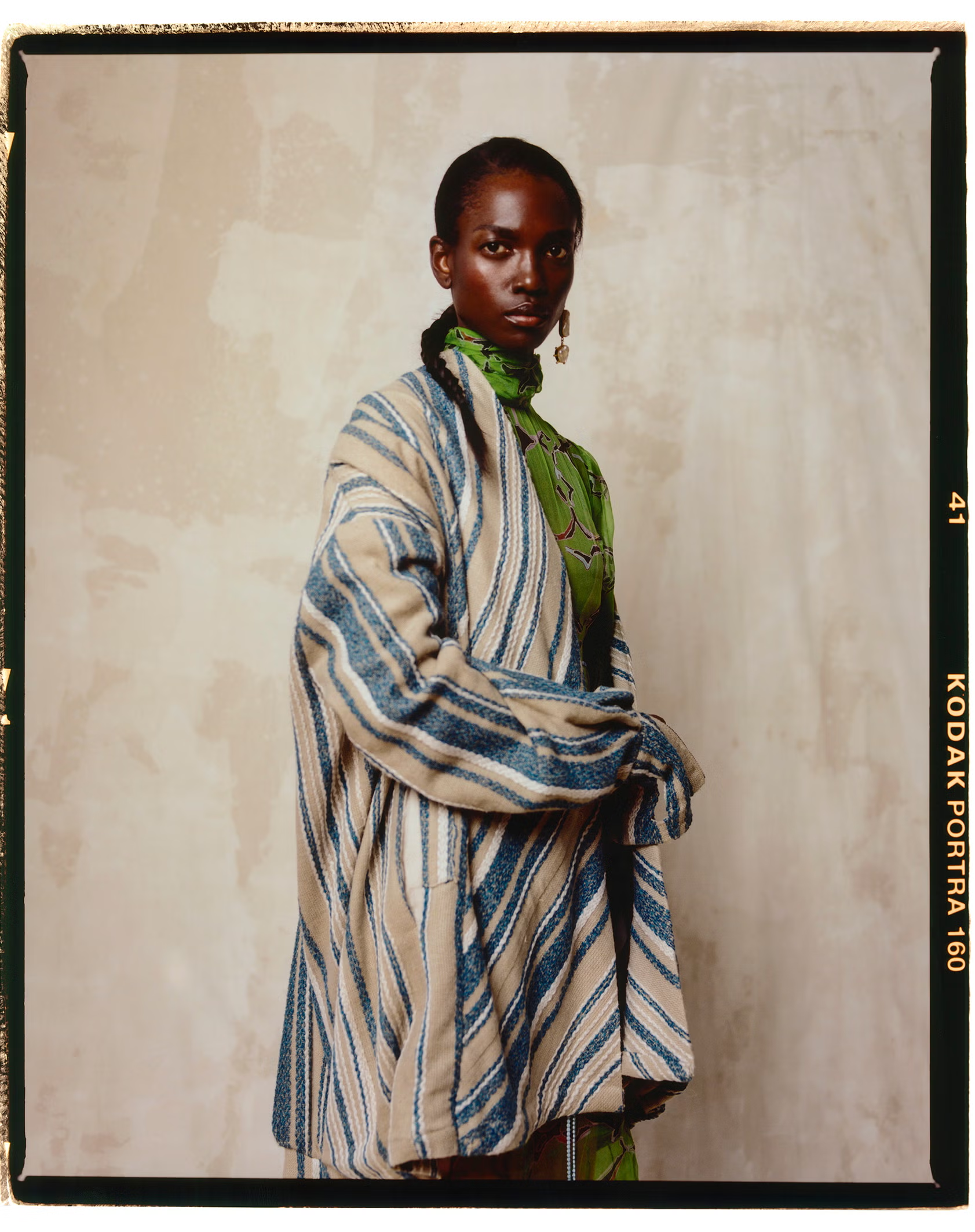Vogue CS in English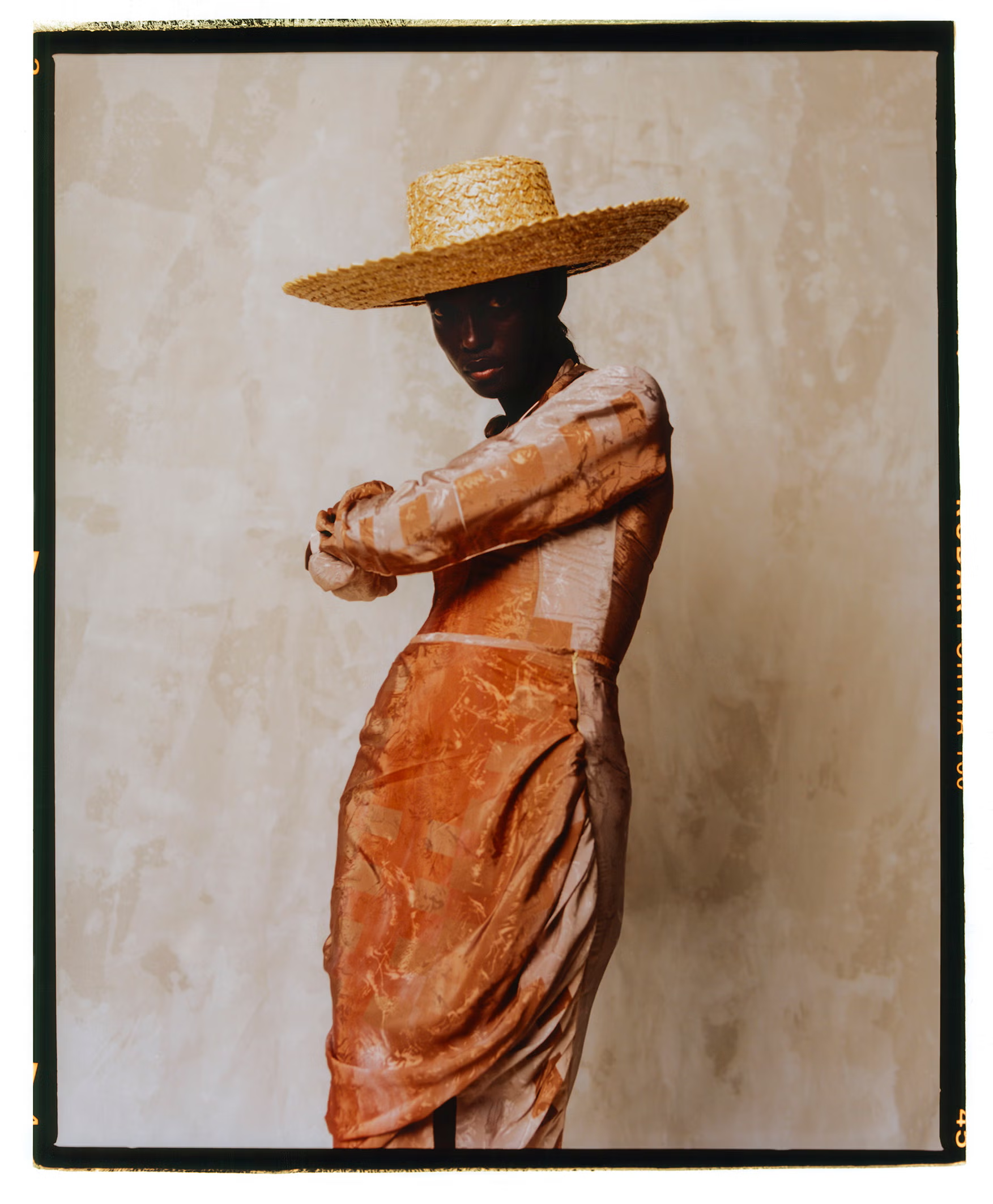
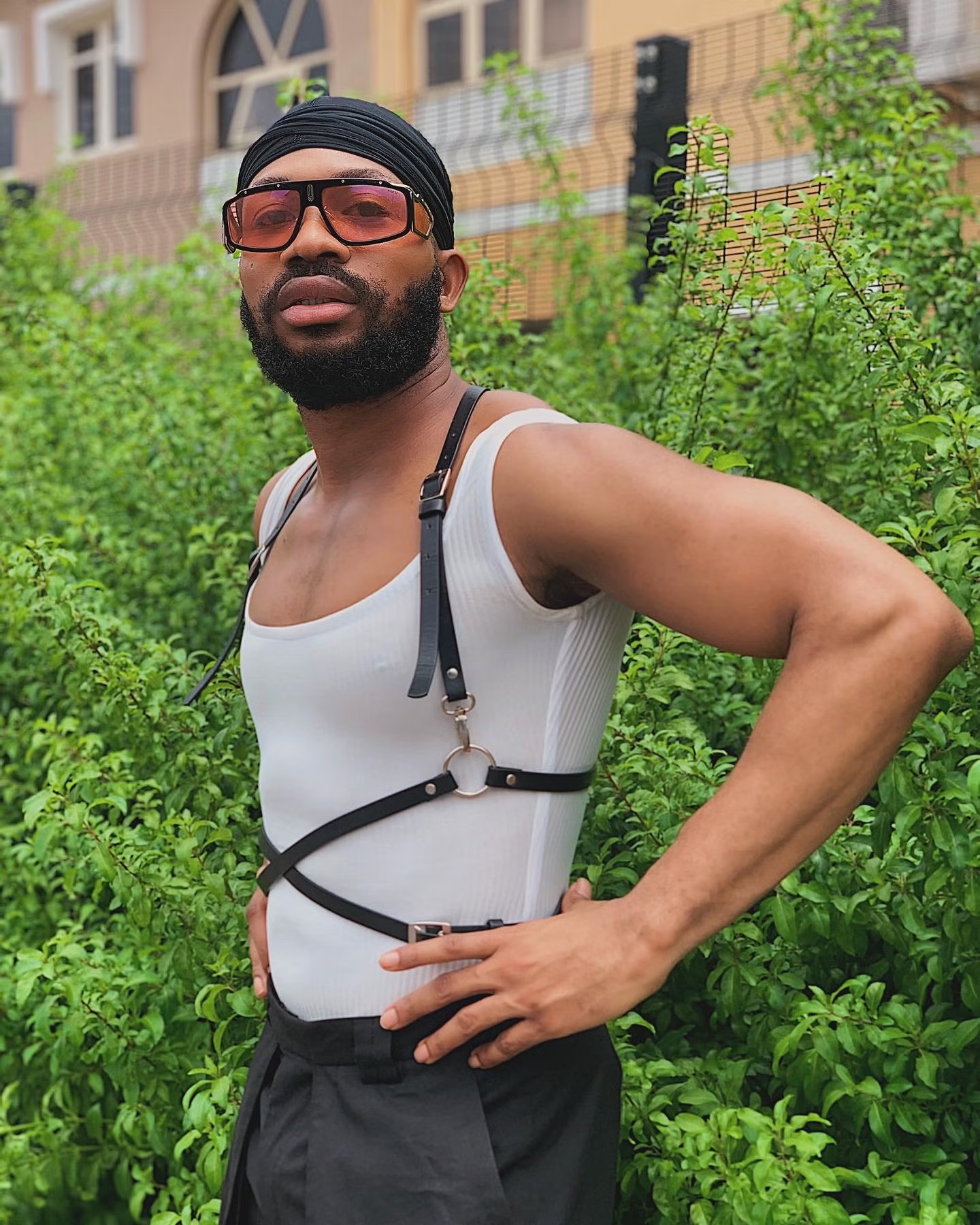
Interview with Adebayo Oke-Lawal of Orange Culture
Ooooota Adepo1. 8. 2020

Foto: Phys Frampton
Blouse, skirt, all Orange Culture; hat, gloves, all Stylist own; necklece, Ami Doshi Shah (sold at Koibird).
Ooooota: What do the words ‘orange’ and ‘culture’ mean separately? What do they mean together?
Adebayo: Orange Culture references a story I wrote for a writing class about the orange boy. It details his experiences of toxic masculinity. I saw the colour orange as an alternative to more typical masculine shades like red or blue. I grew up very different to most boys, I was going to an all-boys school, a very hyper-masculine all-boys school, and I was very tiny, and I had big glasses. People would say 'talk louder', 'talk like a man', 'do this', 'do that'. There was always aggravation towards me just because of the way I presented myself. I was bullied a lot.
The orange boy was an individual. He was unique, he didn't really fit in, but he celebrated his difference in spite of this. It was about saying that whatever society had called me to be wasn't who I wanted to be and that's fine. There wasn't only one type of man. There wasn't only one yardstick to measure a man's masculinity. There were various ways you could be a man. I could be a man, at that time, in a pink suit and I wouldn't be thought of as less than.
That was the narrative behind the ‘orange’ in Orange Culture - a culture that represents accepting individual expressions of self without limitations. Orange Culture is a brand that fights for individuality and celebrates a new age of liberation.

Orange Culture
Ooooota: Your label has been described as a movement. How so and what paradigms do you seek to shift?
Adebayo: Yes, it has. This is because we started a lot of conversations around masculinity and gender, vulnerability in men and a lot of conversations that people did not want to have around who the man is or is not supposed to be. So, it became a movement against stereotypical roles and the damage toxic masculinity plays in today’s relationships and emotionality of the man.
Also coming from a place that held on strongly to certain narrations of masculinity and stereotypes of how African fashion should be expressed, my brand has always set the path for that opposition. Thankfully there’s been a lot of progress and willingness to embrace this new expression in more recent years, as opposed to all the hate we received in earlier years; proof that these conversations are so important and can enact some level of social change
Ooooota: What is masculinity to you?
Adebayo: A word I do not think about or allow limit my expression.
Ooooota: What is femininity to you?
Adebayo: A word I do not think about or allow limit my expression.
Ooooota: As a self-taught designer, how did you get the necessary training for your profession? How do you ensure your design team maintains the skillset needed to produce well-made clothing?
Adebayo: I had to intern a lot and watch a lot of video tapes to teach myself - I couldn’t afford or access fashion schools and fashion wasn’t something Nigerian parents had experienced seeing success in, in their generation - so I could not convince them to believe in sending me to fashion school.
My tailors are constantly having conversations with experienced tailors to help improve their work. We like to listen to feedback from our customers. I am constantly trying to learn and to also transfer knowledge to my team. Knowledge is power so every opportunity I get to learn and be better I take it and I ensure my team benefits too. Our experience with buyers keeps helping us as well to educate our production team here - especially because we do not want to produce outside of Nigeria - we want to equip the supply chain here and be a part of its development.
Ooooota: Tell us about where your drive to teach comes from. Why is it important to you? How have you translated this to your Painting Your Dreams project?
Adebayo: My passion for teaching came from the fact that I didn’t have access to this education in fashion when I was growing up, due to the fact that it wasn’t available here or financially an option elsewhere. This led me to start Orange Mentorship which helps to equip aspiring fashion designers with the necessary foundational knowledge they need to grow their businesses. Painting Your Dreams is more focused on helping kids in destitute areas and in shelters by spending time with them, mentoring them, providing finances where we can and basically supporting them.
Ooooota: Describe your most recent collection. What was the inspiration? How should people feel when they wear Orange Culture?
Adebayo: In post-colonial Eastern Nigeria, there is a story of a man, Area Scatter - a witch doctor turned artist who isolates for seven months only to emerge as a distinguished entertainer with an ornamental thumb piano, parading the cityscape dressed as a female, blurring the lines between gender binaries and clothing, with the determination to live. The term ‘Area Scatter’ is now commonly appropriated to one who upsets a scene, who stands out, who is considered different and at once fearless.
Inspired by this, I began my SS21 collection with a question - when it comes to representation, who was before us? Orange Culture’s The Faces in the Cloud collection examines the value in being different and the communities in which difference occurs, which can either serve as a spectacle or an embrace. It is a political decision to wedge fabrics that complicate yet offer a solidified stance – a peaceful coexistence. The fabrication is soft but deliberately charged against a few hard pieces. It forces contact, using intricate details to mirror a sense of uniqueness and individuality.
I wanted to provoke an idea that perhaps by exploring a figure like Area Scatter and the gaze that was cast upon him in the 70s, and the other people who have exhibited bravery and courage by, not standing out but living in their fullness, we can understand the power within us to define the times of our life by ourselves. It is a powerful story not just about identity and survival, but of resilience that comes from an understanding of oneness. No story sits by itself. Our stories are woven by the fabric of our shared humanity. Yet it is often the case, this idea that one is not only marginalized but their story is seen as alien, something odd and deserving of exclusion. I have always understood clothing through stories and for me this was a way of peeling back, of thinking of how we exist in relation to what was before us. The pieces are deliberately soft, almost fragile, representing an understanding and thus caution, that the harm we do to others, we also do to ourselves. For me, now more than ever, it is important to highlight that we have a human ability to rescue ourselves from violence.
In the wake of an overwhelming social and health crisis felt across the globe, where people have been made to isolate, ‘The Faces in the Cloud’ is an ode to those who have used their style and visual representation to fight oppression. Often in societies, people look to clothing for meaningful discourse on identity. It becomes not just how one is seen, but particularly how one is accorded dignity to live. Although clothing is a visceral component to an identify, this collection exalts forms and textures as more than a decision to be different. It's an answer to surviving.
Ooooota: Your partnership with Nigerian-musician Davido was brilliant. Is it important for you to collaborate with artists in different disciplines? Do you feel more culturally relevant as a result?
Adebayo: I think it’s important to collaborate across borders and exist in the minds of consumers from various spaces. David was such an amazing person to collaborate with and he pushed us into a new aspect of the consumer space.
Ooooota: What are the biggest challenges of operating a fashion business from Lagos, Nigeria?
Adebayo: Financial availability, the lack of governmental support and infrastructure. We lack a lot, so we have to work much harder than most to exist, operate and to survive as a creative business. It is one of the hardest spaces to grow a fashion brand.
Ooooota: How can fashion encourage people to be more open-minded, or to be themselves?
Adebayo: We hold the power to use fashion to tell stories and to speak up on issues. Today’s customer is interested in the story behind the collection and now more than ever, what we do with the power we wield is highly important. In writing, shows, models and films we create, we speak on what we represent and what we want to see changed in the world.
Ooooota: How can the African fashion calendar and industry better support talented designers like yourself?
Adebayo: The calendar as pushed by Lagos Fashion Week is doing a great job supporting designers. What we both need is the support of the bodies beyond - government and the likes – in the development of manufacturing, textile, financing, infrastructure and more to help the industry grow.
Ooooota: In your opinion, what should be the role of large European and American fashion houses in engaging with African talent? Is this engagement necessary or not?
Adebayo: I think collaborating and not appropriating. Europe and America have benefited a lot from these industries [and Africa] through inspiration and even through sourcing. It’s time to give back and collaborate to help develop the spaces they’ve taken so much from. It’s time to see IKEA x Orange Culture, H&M x Orange Culture, LV x Orange Culture, and so much more!
Ooooota: What’s next for you?
Adebayo: Expansion! Lol - we have a lot planned in terms of expanding in manufacturing, education and so much more.
